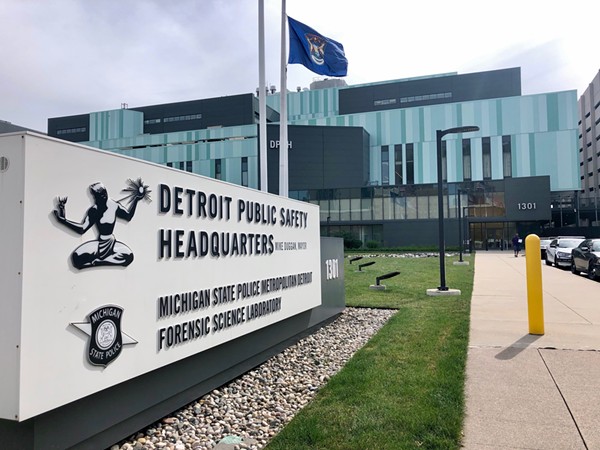Detroit police commissioners are calling for an internal, full-scale investigation of cases handled by a former Detroit detective after Metro Times published a two-part series exposing her aggressive and illegal tactics that led to false confessions and wrongful imprisonments.
In the 1990s and early 2000s, Barbara Simon was known as “the closer” because of her knack for gaining confessions and witness statements. Her method of confining young Black men to small rooms at police headquarters for hours without a warrant, making false promises, and lying about evidence that didn’t exist led to the false imprisonment of at least five men.
Many more innocent people are still behind bars because of her tactics, activists and lawyers say.
At a Detroit Board of Police Commissioners meeting Thursday, commissioners called on the department to review the hundreds of cases handled by Simon, who retired in 2010.
“This has to be taken very, very seriously,” Detroit Board of Police Commissioners Chairman Darryl Woods tells Metro Times. “You don’t just read an article on this level. This is not a situation where we should sit back and watch. We need to take a close look at this. Do your due diligence and see if anything bad happened on the watch of the Detroit Police Department.”
Detroit Police Deputy Chief Tiffany Stewart told commissioners that she “did read a portion of part one” of the series and said that the responsibility to investigate Simon’s cases ultimately falls on the Wayne County Prosecutor’s Office, which has a conviction integrity unit (CIU) tasked with freeing innocent people from prison.
“The Wayne County Prosecutor’s Office has a conviction integrity unit, and that is actually spearheaded through their unit,” Stewart said. “Prisoners who have appeals or concerns with their case can navigate to this unit to work in concert with the Wayne County Prosecutor’s Office, and they will pull the case, investigate it, and make a determination from that point.”
Problem is, that unit is understaffed and has only dismissed three cases since January 2023, and none of those cases involved Simon. In fact, the prosecutor’s office fought to keep men in prison who were ultimately exonerated because of Simon’s handling of the investigations.
Metro Times is awaiting a response from the prosecutor’s office.
Police Commissioner Ricardo Moore, who first called on an internal investigation of Simon’s cases Thursday, says he disagrees that the responsibility only lies with the prosecutor’s office since the detective worked for DPD.
“It seemed shocking to me that the department saw complaints of a pattern of behavior and wouldn’t want to review the cases and make a recommendation to the prosecutor’s office,” Moore tells Metro Times. “I think it’s worth the department investigating the actions themselves instead of punting to the prosecutor’s office.”
Former Police Commissioner Reginald Crawford agrees and says DPD has a responsibility to determine if its detective violated the law to elicit false confessions and witness statements.
“Prosecute everyone responsible for wrongful convictions,” Crawford tells Metro Times. “Detroit police commissioners should call on the Wayne County prosecutor and police chief to investigate and prosecute all responsible for wrongful convictions. … There’s no justice for the wrongfully convicted until all are held accountable.”
At the commission meeting, Eric Blount, a minister at Sacred Heart Catholic Church in Detroit, compared Simon’s actions to the Algiers Motel massacre in July 1967, when three Black teenage boys were killed by a task force composed of Detroit cops, Michigan State Police, and the Michigan Army National Guard. Blount said the Metro Times series detailed “the evilness that a detective perpetrated against this community time and time again and affected people’s lives.”
“When you do something that evil, you affect that person, that family, that community, that city, that state. The world hurts when you do something like that,” Blount said.

Steve Neavling
Mark Craighead and Lamarr Monson were exonerated after it was found that Detective Barbara Simon used deceptive and coercive interrogation techniques on them.
Mark Craighead, who was exonerated in 2022 of a murder he didn’t commit after he falsely confessed under pressure from Simon, says DPD has a moral responsibility to investigate their former detective’s actions. Many more innocent people are still in prison, he says, because the police department and prosecutors are refusing to review cases handled by Simon, who has been admonished by judges.
In February 2021, Wayne County Circuit Court Judge Shannon Walker granted Craighead a new trial and said Simon “has a history of falsifying confessions and lying under oath” and that new evidence in his case “establishes a common scheme of misconduct.”
Craighead says the entire justice system is failing innocent people still behind bars.
“Freedom ain’t free. There is no justice in the justice system,” Craighead says, calling Simon’s actions “Black-on-Black crime.”
“There’s corruption from the top to the bottom,” he says. “There are so many eyes that have been closed, ears that have been closed, and heads that have been turned. There are so many young Black innocent men still in prison because of Barbara Simon.”
Craighead adds, “It’s the responsibility of the police department, the prosecutors, and the judges to look into these cases. They have all turned a blind eye. All of them have an opportunity to right a wrong.”
A six-month Metro Times investigation found that Simon spent years waging psychological warfare on young Black men accused of murder. In the 1990s and early 2000s, she engaged in investigative misconduct, illegally held suspects without a warrant, denied them access to an attorney or phone call, threatened them, and made false promises of leniency, judges and prosecutors would later determine. Suspects who refused to talk without an attorney were confined to jail cells infested with cockroaches, rats, and other vermin.
Her tactics led to false confessions and fabricated witness statements.
Four Black men have been exonerated after defense attorneys showed that Simon elicited false confessions and witness statements that were later recanted. Another man was freed after DNA showed he didn’t commit murder.
The exonerations have cost taxpayers millions of dollars in lawsuit settlements.
Defense attorneys and the Michigan Innocence Clinic say many more innocent people are likely still in prison because of Simon’s tactics. But without a comprehensive review of those cases, they will die in prison, the attorneys and clinic say.
If anyone has a reason to distrust the Detroit Police Department in the 1990s, it’s Woods. He spent nearly 29 years in prison for a murder he says he didn’t commit. In 2019, Woods was released from prison after former Governor Rick Snyder commuted his sentence. A trial judge determined that witnesses in Woods’s case may have committed perjury.
“It’s vitally an important story,” Woods said of the Metro Times series. “The fact of the matter is, injustices occurred. At the time, there was malicious and willful gross neglect and Gestapo tactics. That doesn’t define the men and women of the Detroit Police Department today. But at the same token, it gives them a black eye.”
Other cities have conducted extensive examinations of cases tied to unethical detectives, which has led to numerous exonerations in places like New York City and Chicago.
So far, neither the Detroit Police Department nor the Wayne County Prosecutor’s Office has shown a willingness to dig deeper into cases tied to Simon.
DPD didn’t respond to a request for a follow-up interview about the police commission’s demands for a thorough review of Simon’s cases.


